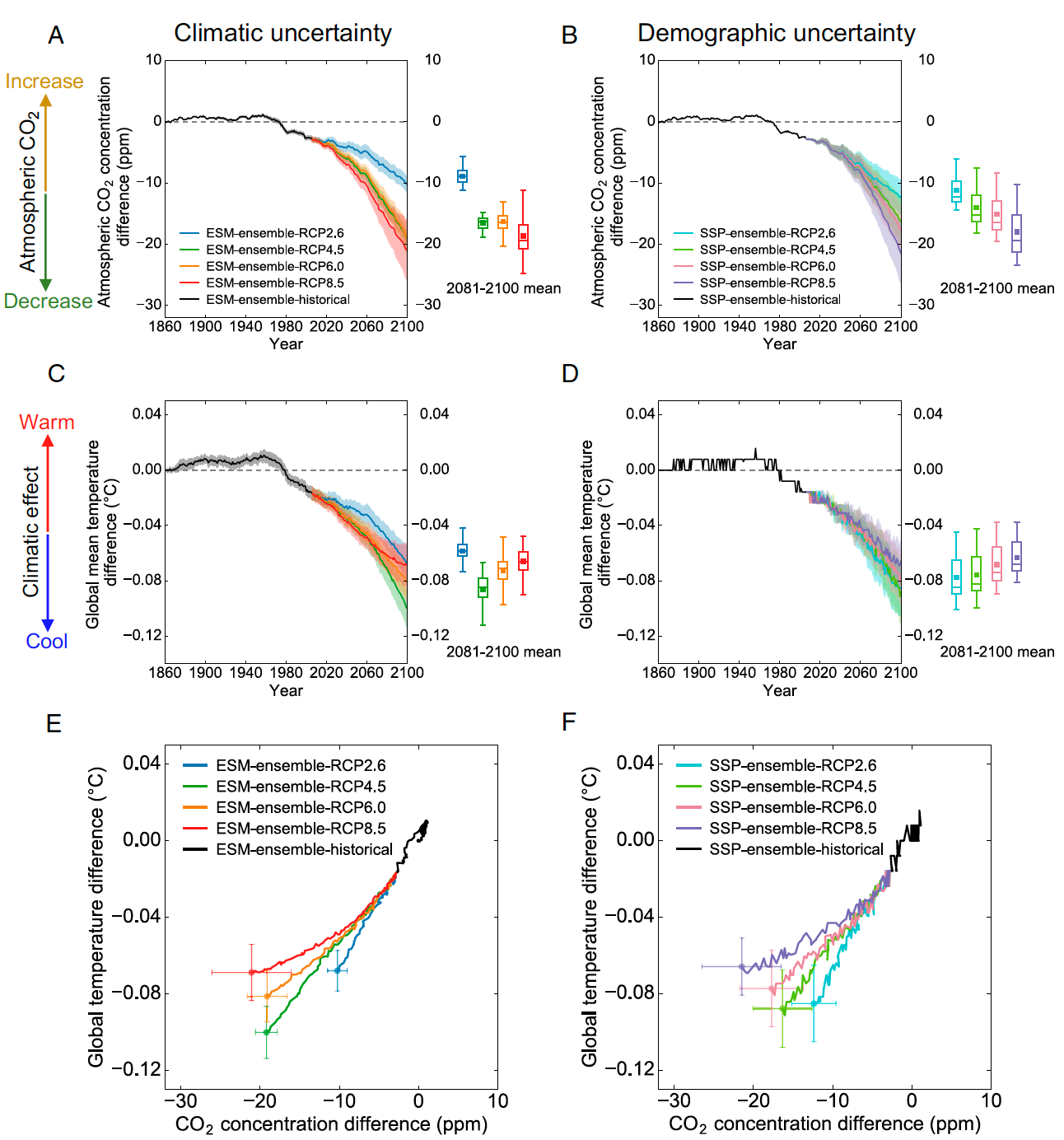Fire (or wildfire) is an important climate-driven disturbance in terrestrial ecosystems, also modulated by human ignitions or fire suppression. Spatio-temporal changes in fire emissions can feed back on the global carbon cycle and the climate system, but whether the trajectories of changing fire activity will exacerbate or attenuate climate change is poorly understood. Previous studies have demonstrated two kinds of feedback in the fire-carbon cycle (vegetation)-climate coupling system: on the one hand, global warming may aggravate the occurrence of future fires, which will release more CO2 into the atmosphere, thus aggravating global warming and forming positive feedback among fire-carbon cycle-climate; On the other hand, due to the impact of human activities (such as farmland expansion and urbanization), the recent global fires show a downward trend, and the reduced fires in turn will slow down the global warming trend by increasing land carbon sinks to a certain extent, forming a negative feedback process. These two opposite feedback mechanisms coexist in terrestrial ecosystems, with significant regional differences, and their net effects may change with the changes of climate and demography in the future. Therefore, the above two feedback mechanisms should be considered at the same time when studying the feedback effect of global climate-carbon cycle caused by changes of fires.
Recently, Sergey Venevsky, a visiting associate professor of the Department of Earth System Science (DESS), Tsinghua University, and Wu Chao, a doctoral graduate of the research group and a postdoctoral fellow at Yale University (now a postdoctoral fellow at the University of Utah), together with researchers from China, the United Kingdom, the United States, Germany and South Africa, used a climate-fire-carbon cycle coupling model integrating 34 earth system models to quantitatively analyze the impact of historical and future fire dynamic changes on global climate-carbon cycle. The research results were published online under the title “Reduced global fire activity due to human demography slows global warming by enhanced land carbon uptake” in a top international journal, Proceedings of the National Academy of Sciences.
This research is based on the research framework of a paper (https://doi.org/10.1016/j.oneear.2021.03.002) published in One Earth, a sister journal of Cell, by Sergey’s Research Group in 2021, with the original model improved and corrected. Through a large number of global-scale coupled model simulations, the "standard" simulation test including dynamic fire process is compared with the simulation results of counterfactual worlds, one with a constant fire regime and another without fire, and the uncertainty of fire prediction caused by climate and changing human demography is quantitatively analyzed. It is found that t changes in human demography tend to suppress global fire activity as compared with the preindustrial global fire distribution pattern. In addition, many future scenarios predict that fires will continue to decrease. The simulation results show that the future global fire reduction may slow down global warming to some extent by increasing land carbon sink. This potentially reduces warming by up to 0.11℃ by 2100, which is equivalent to offsetting 5-10 years of the current global anthropogenic carbon dioxide emissions. At the same time, the Research Group has also found that We show the global relative cooling effect caused by dynamic fire is more obvious under the future low emission scenarios.

Changing fire effects on atmospheric CO2 concentration (A and B) and global mean temperature difference (C and D). E and F: Sensitivity of simulated global mean temperature difference to atmospheric CO2 concentration difference induced by changes in fire carbon emissions.
This study emphasizes that human activities (t ignitions and fire suppression) are as important as climate factors on fire, and we may not be able to comprehensively predict the dynamic changes of future fires by considering the impact of climate change on fire alone. It is pointed out that although fire reduction is beneficial to increasing carbon sink, the negative effects of fire reduction should also be considered when formulating future policies to safeguard human well-being, including the loss of biodiversity in fire-dependent ecosystems (e.g., African savanna) and the increased risk of severe local fires. The research emphasizes that any carbon sink gains from the reduction of fire activities should not replace other actions to deal with climate change, and nature-based climate solutions (including fire management) cannot replace emission reduction to attenuate global warming.
Wu Chao, a 2019 doctoral graduate of the Department of Earth System Science of Tsinghua University and a postdoctoral fellow of Yale University (now a postdoctoral fellow of the University of Utah), is the first and corresponding author. Professor Stephen Sitch and Associate Professor Lina Mercado of College of Life and Environmental Sciences, University of Exeter, Professor Chris Huntingford of UK Centre for Ecology and Hydrology, and Sergey Venevsky, Visiting Associate Professor, Department of Earth System Science, Tsinghua University, Dr. Gitta Lasslop of Center for Biodiversity and Climate Research in Senkenberg, Germany, Professor Sally Archibald of Centre for African Ecology, School of Animal, Plant and Environmental Sciences, University of the Witwatersrand, and Associate Professor Carla Staver of Yale Institute for Biospheric Studies, Yale University, USA, are the co-authors of the paper. This research is supported by the Key Research and Development Program of the Ministry of Science and Technology and the National Natural Science Foundation of China.
Full text link: https://www.pnas.org/doi/10.1073/pnas.2101186119
Contributed by Wu Chao
Edited by Wang Jiayin
Reviewed by Luo Yong and Zhang Qiang